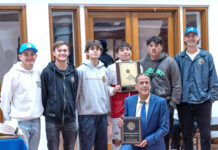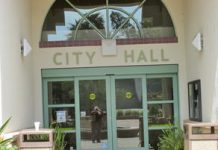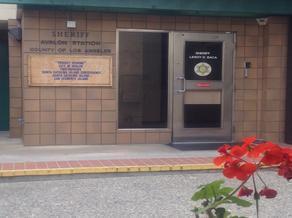The Avalon falcon program is beginning to work and is expected to help improve Avalon Bay’s water quality, according to City Manager Steve Hoefs.
Last month, city of Avalon hired On the Wing Falconry Service to use so-called raptor birds, hawks and falcons, to scare off the pigeons and seagulls that forage for food and leave their waste all over the city.
“It’s going really well,” Hoefs said.
He said the falconer was on the Island four days a week, flying his birds day and night.
The Avalon falcon program is beginning to work and is expected to help improve Avalon Bay’s water quality, according to City Manager Steve Hoefs.
Last month, city of Avalon hired On the Wing Falconry Service to use so-called raptor birds, hawks and falcons, to scare off the pigeons and seagulls that forage for food and leave their waste all over the city.
“It’s going really well,” Hoefs said.
He said the falconer was on the Island four days a week, flying his birds day and night.
“There haven’t been as many (seagulls) at night,” Hoefs said.
He said the seagulls don’t like the presence of the falcons, their natural predators, and eventually go away.
“It’s a long process,” Hoefs said.
According to Hoefs, one mainland resort had a huge seagull problem—as many as 6,000 or 7,000 seagulls were flocking to the resort. He said the resort hired On The Wing Falconry to drive them off and a year later, you would have a hard time finding one seagull there.
Hoefs wasn’t sure where he got the idea to hire a falconer to drive off the city’s winged pests. “I’d heard about it for awhile,” he said.
He said sometimes you see fake owls on some of the boats, but the birds eventually figure out that they are fake.
“I think it’s going to make a big impact on the harbor,” Hoefs said.
Hoefs said readings have shown a direct correlation between seagull droppings and water quality in Avalon Bay Harbor.
City Attorney Scott Campbell addressed the same issue in his October staff report to the council on the falconry program.
“Specifically, common pigeons and western gulls (“nuisance birds”) aggressively forage for food in and around the city, and their wastes have negatively affected the sanitary conditions of the city—specifically including the beaches,” wrote Campbell in his report to the council.
“The continued concentration of nuisance birds will result in an on-going adverse environmental impact and will limit the recreational uses available to the city’s residents at parks and beaches,” Campbell wrote.
In mid-October, the City Council authorized City Manager Steve Hoefs to execute the contract to have On the Wing Falconry Service use raptor birds—to deal with the city’s peskier birds.
Campbell’s staff report said no birds would be killed.
“The raptors are specifically trained such that they will not make physical contact, kill or otherwise harm the nuisance birds,” Campbell wrote.
Hoefs described falconry as a natural way to get rid of the bad birds without harming any of them.
Unfortunately, some of the Island’s native ravens have decided not to play by the same rules as the falcons:
They recently killed a baby falcon from On the Wing.
Hoefs said the falconer was training a baby falcon when a group of ravens ganged up on the young predator bird and killed him.
He said there was no way a single raven could kill a falcon.
Falconry is heavily regulated. Both state and federal licenses are required. According to the California Hawking Club, an 80 percent grade is considered passing. According to the club’s website, of the 300 people who have enrolled in falconry training through the club since 1984, less than 40 have completed the training.
The website asks several questions of would-be falconers, including:
“Will you commit part of your waking hours to a creature who at the very best of times will merely tolerate your presence, is as affectionate as a stone, and at the worst of times will cause you heartache and puncture wounds?
“Could you commit to an average of a half-hour a day, every day, and two to four hours on a hunting day, regardless of school, family, or job—forever?”
There are comparatively few falconers around these days, considering that falconry is one of the world’s oldest sports.
“There are about 700 falconers in California (of 7,000 nationwide) and we are the only falconry support group that exists for California,” according to the website.









